Jeff Names the Planets
Richard Thomas - Staring Into the Abyss

I remember reading the Stephen King short story collections NIGHT SHIFT and SKELETON CREW when I was a kid; wondering how every story somehow sounded the same. Whether a story about Greek Goddesses in rural Maine, or junk-trawling cyborgs in far-future space, always there was that voice. That homey, familiar-but-strange storytelling voice that bled through the spaces between the words. Without knowing what or how King accomplished it, I could feel it every single time. The stories stuck with me.
Richard Thomas stories are about going places - places you don't want to go, and whether you go along willingly, or get dragged behind, always with one question - 'How did I get here?'. And through each story runs that voice;that whispering, insidious voice telling you that no, you're not stopping here; you're only staying long enough to see one more picture, one more image of a soul in motion on the way down. Sometimes you zoom in close through a grubby lens, and other times you skim above the muck, and shake your head in piteous wonder.
Richard Thomas is a broad-stroke painter: he gives you the bones of the stories, the beats, and lets you fill in the rest.
Standout stories include: Steel-Toed Boots, Committed, Victimized, Twenty Reasons to Stay and One to Go, Transmogrify, Rudy Jenkins Buries His Fears.
Highly recommended.
Kin
 Great edge-of-your-seat, terse and lively writing. I enjoyed the hell out of this book, though I felt the ending served the theme more than the story. There were a couple of moments when the characters seemed to drift, blown hither and yon according to plot contrivance instead of motivation, and a couple of the characters were a touch flat/sketched instead of drawn.
Great edge-of-your-seat, terse and lively writing. I enjoyed the hell out of this book, though I felt the ending served the theme more than the story. There were a couple of moments when the characters seemed to drift, blown hither and yon according to plot contrivance instead of motivation, and a couple of the characters were a touch flat/sketched instead of drawn.
Bleed
 An interesting, fun premise marred--ruined even--by amateurish writing. If you're not a fan of adverbs, you are going to be beyond annoyed by the author's infuriating and baffling overuse of the little buggers. Cliche abounds as well: 'made a beeline' should just not be used in the author's voice, ever. And that's not even the worst. Given some serious, hard-line editing, this could have been improved beyond all measure: any momentum generated by the strong idea killed too early by amateur-hour hackery. A shame.
An interesting, fun premise marred--ruined even--by amateurish writing. If you're not a fan of adverbs, you are going to be beyond annoyed by the author's infuriating and baffling overuse of the little buggers. Cliche abounds as well: 'made a beeline' should just not be used in the author's voice, ever. And that's not even the worst. Given some serious, hard-line editing, this could have been improved beyond all measure: any momentum generated by the strong idea killed too early by amateur-hour hackery. A shame.
The Drummer
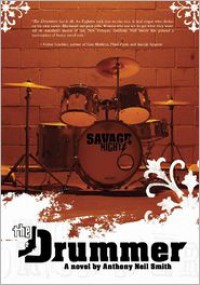 Competently written, tepid 'suspense' novel where not much happens and the main character floats along, directed by events. The MC's fatal flaw is never addressed, and he learns nothing except that 'everyone else is bad and deserves what they get'. Except of course, if said person is from N'awlins, in which case, they are saints. Pun definitely intended.A good read, well-written, but not particularly exciting: a standout element is the impeccable line-editing; very clean prose with very few (if any) errors. A rarity in free/cheap e-books these days. Unfortunately, the services of a content editor to tighten up the suspense and save us the trite 'shallow people are shallow' theme.
Competently written, tepid 'suspense' novel where not much happens and the main character floats along, directed by events. The MC's fatal flaw is never addressed, and he learns nothing except that 'everyone else is bad and deserves what they get'. Except of course, if said person is from N'awlins, in which case, they are saints. Pun definitely intended.A good read, well-written, but not particularly exciting: a standout element is the impeccable line-editing; very clean prose with very few (if any) errors. A rarity in free/cheap e-books these days. Unfortunately, the services of a content editor to tighten up the suspense and save us the trite 'shallow people are shallow' theme.
Outpost
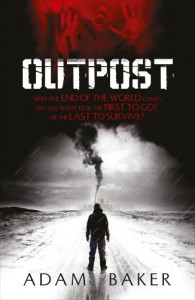 Quite simply one of the best horror novels I've ever read. Think 'The Thing' meets 'Alien' meets 'The Rising'. Claustrophobic and atmospheric, the book is more about isolation and vulnerability than shuffling undead and apocalyptic destruction. It's a simply written book, full of tight, cold sentences and bleak metaphor, where the existential horror of humanity's downfall is re-framed and refocused as individual catastrophe. Vivid characters, moody description, and implacable, crushing doom await you at the Outpost.
Quite simply one of the best horror novels I've ever read. Think 'The Thing' meets 'Alien' meets 'The Rising'. Claustrophobic and atmospheric, the book is more about isolation and vulnerability than shuffling undead and apocalyptic destruction. It's a simply written book, full of tight, cold sentences and bleak metaphor, where the existential horror of humanity's downfall is re-framed and refocused as individual catastrophe. Vivid characters, moody description, and implacable, crushing doom await you at the Outpost.
The Year's Best Dark Fantasy & Horror 2012 Edition
 What an awful, boring yawn-fest. *Really* heavy on the 'Dark Fantasy' (which apparently means loads of bored, stuffy, slightly discomfited English people and names like Botheringstile--I know, try and slow your pulse, because there are a ton of bored, elegant rich vampires and bored, elegant werefolk too!), and the horror is mainly of the Earl Grey and stuffed armchair variety. The word 'stultifying' could have been invented just to describe this book.A couple of notable bright spots: 'Vampire Lake', which you may have seen before--a dark, sonorous, poetic piece of western horror, showing why Norm Partridge, at his best, is such a master.And what horror comp would be complete without a Stephen King story? This is a goddamn fine one, an old school short story all the way, quick, clean, and complete with a great ending. The kind of story that has always separated King from the pretenders, and the kind of story that shows how a storyteller will always be better than a writer of stories.
What an awful, boring yawn-fest. *Really* heavy on the 'Dark Fantasy' (which apparently means loads of bored, stuffy, slightly discomfited English people and names like Botheringstile--I know, try and slow your pulse, because there are a ton of bored, elegant rich vampires and bored, elegant werefolk too!), and the horror is mainly of the Earl Grey and stuffed armchair variety. The word 'stultifying' could have been invented just to describe this book.A couple of notable bright spots: 'Vampire Lake', which you may have seen before--a dark, sonorous, poetic piece of western horror, showing why Norm Partridge, at his best, is such a master.And what horror comp would be complete without a Stephen King story? This is a goddamn fine one, an old school short story all the way, quick, clean, and complete with a great ending. The kind of story that has always separated King from the pretenders, and the kind of story that shows how a storyteller will always be better than a writer of stories.
Crooked Little Vein: A Novel
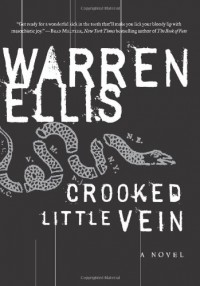 Not nearly as good as the premise would indicate. It starts off a little flat, toying with the down-on-his-luck PI trope, then veers into bizarro-lite terrain and teenage boy fantasies about sexy girls who just want sex with their sex and sexy-sex. After that, it's a series of loose, disjointed interludes, weirdness is portrayed, but most of what the writer shows off is disdain for his characters, the setting, popular culture (I think I caught a Britney Spears joke somewhere in here... zing!), and modern life in general. Specifically, America: Ellis so straight-facedly blathers on about the evil of popular American culture, I began to think it was some kind of ironic-but-serious but-really-ironic game invented by the author to entertain himself.The plot meanders along, with a couple of standout scenes, (The Falconer is promising, but ends up just a plot device), then wobbles to a predictable finish.Why didn't I like this book more? It had it all... but it lost me.
Not nearly as good as the premise would indicate. It starts off a little flat, toying with the down-on-his-luck PI trope, then veers into bizarro-lite terrain and teenage boy fantasies about sexy girls who just want sex with their sex and sexy-sex. After that, it's a series of loose, disjointed interludes, weirdness is portrayed, but most of what the writer shows off is disdain for his characters, the setting, popular culture (I think I caught a Britney Spears joke somewhere in here... zing!), and modern life in general. Specifically, America: Ellis so straight-facedly blathers on about the evil of popular American culture, I began to think it was some kind of ironic-but-serious but-really-ironic game invented by the author to entertain himself.The plot meanders along, with a couple of standout scenes, (The Falconer is promising, but ends up just a plot device), then wobbles to a predictable finish.Why didn't I like this book more? It had it all... but it lost me.
Dead of Winter
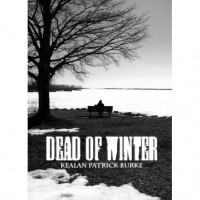 As always, I just don't dig themed collections; I say present the writer's best work and to hell with the common thread. That being said, this is pretty crackling: the theme is winter (maybe it's snow), and Burke is a strong short story writer. There are some really solid horror tales in here, and some truly gut-twisting surprise endings. Loved it.
As always, I just don't dig themed collections; I say present the writer's best work and to hell with the common thread. That being said, this is pretty crackling: the theme is winter (maybe it's snow), and Burke is a strong short story writer. There are some really solid horror tales in here, and some truly gut-twisting surprise endings. Loved it.
Coraline
 Neil Gaiman is a wonderful writer with an impeccable eye/ear for authoritative children's POV. If I had it to do over, I would have read this first, then seen the movie. The book is much creepier and more effective, while the movie is more entertaining and whimsical.
Neil Gaiman is a wonderful writer with an impeccable eye/ear for authoritative children's POV. If I had it to do over, I would have read this first, then seen the movie. The book is much creepier and more effective, while the movie is more entertaining and whimsical.
Johnny Halloween: Tales of the Dark Season
 A Halloween-themed collection. I love Partridge's short fiction, but the limitation of the Halloween theme detracts a bit from the overall impact. Instead, I would recommend: Lesser Demons, a far superior collection.
A Halloween-themed collection. I love Partridge's short fiction, but the limitation of the Halloween theme detracts a bit from the overall impact. Instead, I would recommend: Lesser Demons, a far superior collection.
Genital Grinder
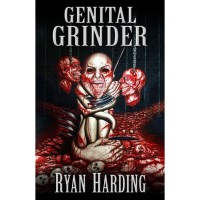
Ed Lee meets Brian Keene. It's certainly gross; there are a couple of passages that were revolting, but without any of Lee's veneer of psychological/psychoanalytical color. The last story is a standout, if only for its ideas; the execution is flat and rushed, with archetypes substituted for character. Maybe if Harding combined his superlative gross-out capabilities with the kind of Grand Guignol macro-horror used in the last story, this would have been a more varied and satisfying collection.
The Teratologist
 A little bloated, though a good solid story underneath the window-dressing. The flabbiness is thrown into the spotlight when the climax and denouement are so rushed and tossed off.
A little bloated, though a good solid story underneath the window-dressing. The flabbiness is thrown into the spotlight when the climax and denouement are so rushed and tossed off.
Carnal Surgery
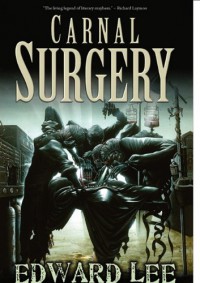 Not nearly as gory as Brain Cheese Buffet, leaning more toward gritty crime shorts with a tinge of horror. The straight up horror is more philosophical and sedate, not overly chilling, but still written with a sure hand.
Not nearly as gory as Brain Cheese Buffet, leaning more toward gritty crime shorts with a tinge of horror. The straight up horror is more philosophical and sedate, not overly chilling, but still written with a sure hand.
Brain Cheese Buffet
 This book is disgusting. So gross you blurt out shocked laughter every couple of pages. Some of the stories are better than others, but most of them aren't only shocking for shock value. Good stuff, though not for everyone.
This book is disgusting. So gross you blurt out shocked laughter every couple of pages. Some of the stories are better than others, but most of them aren't only shocking for shock value. Good stuff, though not for everyone.
2k to 10k: Writing Faster, Writing Better, and Writing More of What You Love
 Do you play fantasy football? Follow sports? Do you like math/statistics? If you are, and you're a writer (wow, only two people still with your hands up - good for you!), you will probably find some good actionable advice from the 'system' Rachel Aaron has created.The system is, at its base, a 3 point 'triangle' of strategies devised to boost word count. Aaron believes that quality is a natural byproduct of sheer word-count (loosely based on Gladwell's 10,000 hour 'rule'), but the main thrust of this short book is as-advertised: how to dramatically increase the number of words you write per hour.One of the main tenets is that you must outline. Aaron presents herself as a somewhat obsessive outliner, so pantsers may not really grok or be able to implement the ideas put forth.So, bust out your spreadsheet software and Scrivener and see if it works for you.
Do you play fantasy football? Follow sports? Do you like math/statistics? If you are, and you're a writer (wow, only two people still with your hands up - good for you!), you will probably find some good actionable advice from the 'system' Rachel Aaron has created.The system is, at its base, a 3 point 'triangle' of strategies devised to boost word count. Aaron believes that quality is a natural byproduct of sheer word-count (loosely based on Gladwell's 10,000 hour 'rule'), but the main thrust of this short book is as-advertised: how to dramatically increase the number of words you write per hour.One of the main tenets is that you must outline. Aaron presents herself as a somewhat obsessive outliner, so pantsers may not really grok or be able to implement the ideas put forth.So, bust out your spreadsheet software and Scrivener and see if it works for you.
Darkness on the Edge of Town
 Very restrained Keene, with lots of atmosphere and a little flab around the middle. If you like Brian Keene, you'll like this book. If you like super-extreme splatter-punk, this might be a bit of a drag for you. I get the feeling this may have been better as a novella - or even a short story. It is a quick and easy read, which is good, but I was hoping it would add more to the Keene universe.
Very restrained Keene, with lots of atmosphere and a little flab around the middle. If you like Brian Keene, you'll like this book. If you like super-extreme splatter-punk, this might be a bit of a drag for you. I get the feeling this may have been better as a novella - or even a short story. It is a quick and easy read, which is good, but I was hoping it would add more to the Keene universe.



